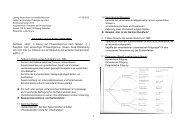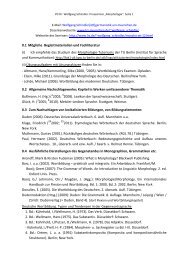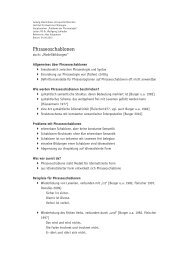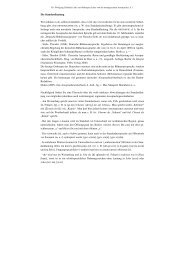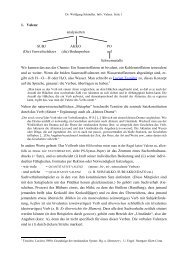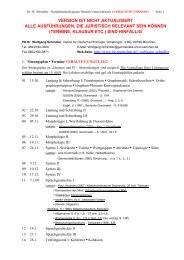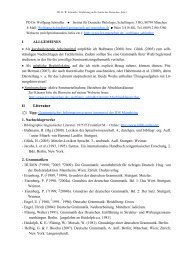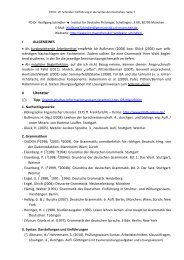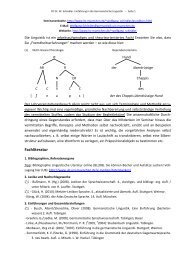Chapter 18 Lexical Functions: Description of Lexical Relations in a ...
Chapter 18 Lexical Functions: Description of Lexical Relations in a ...
Chapter 18 Lexical Functions: Description of Lexical Relations in a ...
You also want an ePaper? Increase the reach of your titles
YUMPU automatically turns print PDFs into web optimized ePapers that Google loves.
!<br />
!<br />
38. Loc<br />
temp<br />
<strong>in</strong><br />
= localization <strong>in</strong> time<br />
situation<br />
!<br />
with respect to (L).<br />
Examples<br />
—<strong>Chapter</strong> <strong>18</strong>. <strong>Lexical</strong> <strong>Functions</strong>— 49<br />
L´ = Loc (L) is a preposition govern<strong>in</strong>g L and designat<strong>in</strong>g a temporal localization <strong>of</strong> a<br />
<strong>in</strong><br />
!<br />
temp<br />
temp<br />
Loc (arrestN) = at the time [<strong>of</strong> ART ~]<br />
<strong>in</strong><br />
Loc<br />
temp<br />
<strong>in</strong> (capture) = at the moment [<strong>of</strong> ~]<br />
Loc (analysis) = <strong>in</strong> the course [<strong>of</strong> ART ~]<br />
<strong>in</strong><br />
Loc<br />
temp<br />
It is <strong>in</strong>terest<strong>in</strong>g to compare the values ! <strong>of</strong> Loc from different names <strong>of</strong> po<strong>in</strong>ts <strong>in</strong> time:<br />
<strong>in</strong><br />
[John will arrive] on Monday at 3P.M. next week <strong>in</strong> the even<strong>in</strong>g <strong>in</strong> 2006<br />
temp !<br />
As one can see, for Loc the keyword L refers to a fact or to a time ‘segment’ dur<strong>in</strong>g<br />
<strong>in</strong><br />
the occurrence <strong>of</strong> which someth<strong>in</strong>g happens. !<br />
temp<br />
temp<br />
temp<br />
<strong>in</strong> (capitalism) = under [~]<br />
Loc , with the mean<strong>in</strong>g (reach<strong>in</strong>g a po<strong>in</strong>t <strong>in</strong> time), and Loc ((start<strong>in</strong>g from a po<strong>in</strong>t <strong>in</strong><br />
ad ab<br />
!<br />
time)) are theoretically possible, but I do not have examples illustrat<strong>in</strong>g sufficient variability and<br />
phraseological character <strong>of</strong> their expressions.<br />
!<br />
39. Instr [Lat. <strong>in</strong>strūmentum (<strong>in</strong>strument)] = by means <strong>of</strong><br />
L´ <strong>of</strong> Instr(L) is a preposition mean<strong>in</strong>g (by means <strong>of</strong> [L]); L refers to a physical entity or a<br />
fact which is used <strong>in</strong> order to br<strong>in</strong>g about a desired state <strong>of</strong> affairs.<br />
Examples<br />
Instr(typewriter) = on [ART ~] Instr(satellite) = via [~]<br />
Instr(mail) = by [~] Instr(argument) = with [ART ~]<br />
40. Propt [Lat. propter (because <strong>of</strong>)] = because <strong>of</strong><br />
Semantically, the LF Propt is related to the LF Caus [≈ (cause)), see below, No. 49, p. 00.<br />
More precisely, Propt is an abbreviation for Adv 2Caus [≈ (be<strong>in</strong>g caused by...)]. Syntactically, L´<br />
= Propt(L) is a preposition mean<strong>in</strong>g (because <strong>of</strong>/as a result <strong>of</strong> [L]); L itself is a noun.<br />
Examples<br />
Propt(fearN) = from, out <strong>of</strong> [~] Propt(loveN) = out <strong>of</strong> [one’s ~ <strong>of</strong> ...]<br />
Propt(lackN) = for [~ <strong>of</strong> NY] Propt(fireN) = <strong>in</strong> [ART ~] [John was killed <strong>in</strong> a fire.]<br />
Rus. Propt(revnost´ (jealousy)) = iz (out <strong>of</strong>) [revnost+i]<br />
Rus. Propt(strax (fear)) = so (from) [strax+u]<br />
Rus. Propt(bol´ (pa<strong>in</strong>)) = ot (<strong>of</strong>) [bol+i]<br />
!<br />
temp


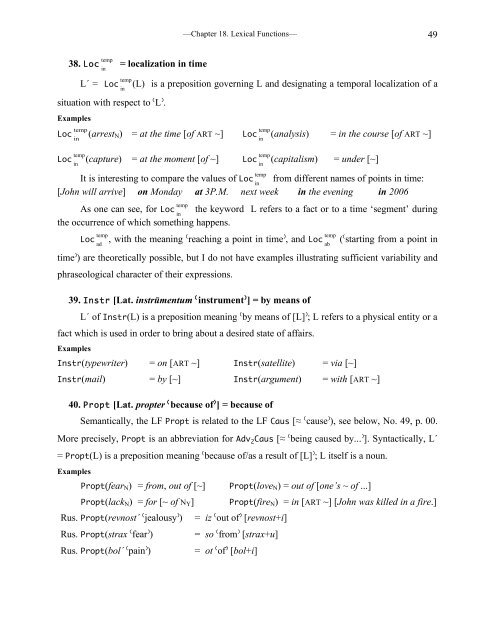
![E-Mail: Wolfgang.Schindler[ätt]germanistik.uni-muenchen.de Web ...](https://img.yumpu.com/51590147/1/184x260/e-mail-wolfgangschindlerattgermanistikuni-muenchende-web-.jpg?quality=85)
